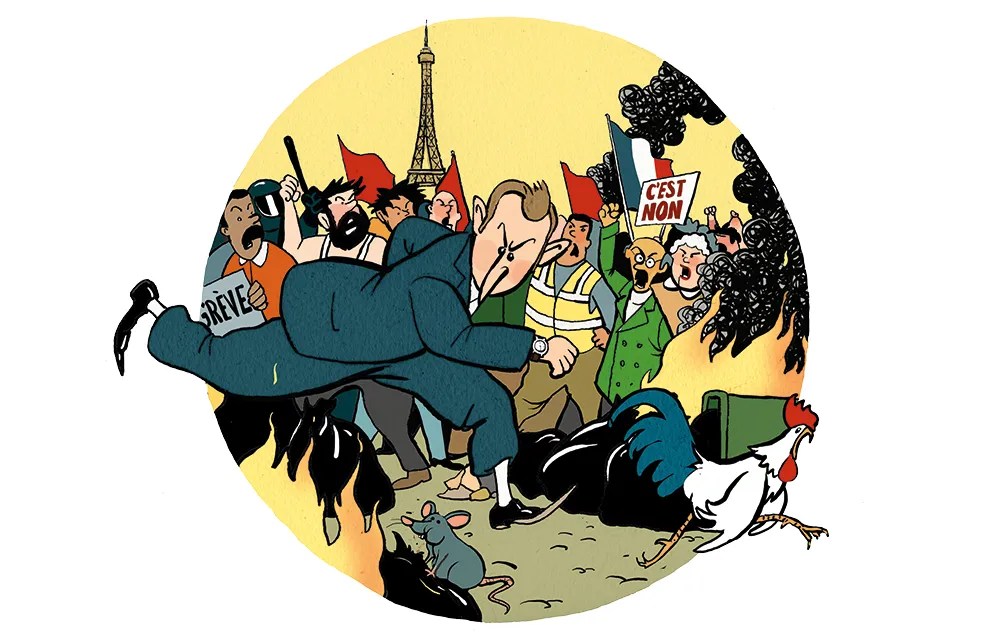Sébastien Lecornu’s government has survived a no-confidence vote – but only because Emmanuel Macron shelved the pension reform that once defined his presidency. Today’s motion of censure fell short of the 289 votes needed to bring down the government, sparing Macron for now but leaving his authority weakened. What began as a crusade for fiscal responsibility has ended in capitulation, exposing the fragility of his presidency.
If the vote saved Macron in the short term, it exposed how completely he has lost control of his political base
Out of 577 members of parliament, 271 voted for censure, leaving the government 18 votes short of collapse. It was not a narrow escape but a warning: proof that Macron’s majority no longer exists in any meaningful sense. Seven Socialist MPs defied party orders to back the no-confidence motion, joined by a single Republican.
The suspension of the pension reform, Macron’s defining achievement, bought him the Socialists’ abstention but cost him his credibility. The reform, passed last year amid mass protests, raised the retirement age from 62 to 64. Macron called it a ‘moral duty’. Now, under pressure, he’s shelved the changes he claimed were essential to saving France from fiscal collapse. It’s the ultimate betrayal of his own presidency.
Lecornu presented the suspension as a ‘pause’. In truth, it was an act of desperation. He promised the shortfall would be offset by spending cuts, a pledge few believe. On Wednesday afternoon, answering a question in the National Assembly, he confirmed the government will formally submit the suspension to Parliament in November. This is nothing other than the burial of Macron’s signature reform.
Lecornu put the cost of the suspension at €2.2 billion by 2027. But that estimate is widely viewed as optimistic. It ignores lost revenue from delayed contributions and the knock-on effects on the pension fund’s deficit. Analysts note that the true cost could be significantly higher once those indirect losses are counted. And this comes as the new 2026 draft budget already piles on €28.5 billion in additional spending and €20 billion in new taxes, including levies on company bonuses, benefits, and investment holdings. France already has one of the heaviest tax burdens in the world, with a tax-to-GDP ratio of around 44 per cent, the highest in the OECD.
For years, Macron positioned himself as Europe’s responsible moderniser, the man who would restore France’s seriousness. He was presented as a brilliantly successful banker. Now Brussels is wondering whether France can still be trusted to manage its own accounts.
The self-proclaimed champion of European sovereignty has turned his country into a case study in dependency. Analysts warn that the suspension of the pension reforms could widen France’s bond-yield spread over German bunds, increasing borrowing costs across the eurozone. Investors are questioning whether Macron’s fiscal retreat signals a return to the old French pattern of high spending and low discipline. If that spread widens further, France risks pulling the entire eurozone down, tightening credit and triggering fresh market contagion.
If the vote saved Macron in the short term, it exposed how completely he has lost control of his political base. The centre that once made him untouchable has collapsed. The Socialists, who kept him alive, now celebrate his retreat as proof that Macronism is dead. Their leader, Boris Vallaud, called the suspension ‘a victory’. The CFDT, France’s largest trade union, echoed his jubilation. Macron’s enemies are now the custodians of his legacy.
Among the trophies the Socialists took was a pledge to forswear Article 49(3), the blunt instrument that lets a government pass a bill without a vote unless a no-confidence vote succeeds. Since 2008, it can be used only once per session on ordinary laws but without limit for budgets. Lecornu now says even that’s off the table. In practice this will lead to gridlock. The Senate’s centre-right will block left-leaning rewrites, and without 49(3) the Assembly can’t force a bill through unless it can muster a real majority on final reading. Yet the government can still implement the budget by decree. If the Finance Bill isn’t passed within 70 days, the government can implement them by ordonnance. So everyday legislation jams, but the lights stay on.
Meanwhile, Les Républicains’ Bruno Retailleau called Lecornu’s government ‘a hostage of the Socialists’ and warned it is steering France ‘straight into the wall of a financial crisis’. Éric Ciotti went further, describing Lecornu as ‘the most feeble prime minister of the Fifth Republic’. Marine Le Pen mocked the right for ‘giving itself’ to Macron, while Jordan Bardella derided the Socialists and Republicans as ‘the friends’ club’.
The right’s capitulation has been nothing short of pathetic. It is a spineless betrayal of their voters. Retailleau and Ciotti mouth tough words yet Les Républicains (LR) cling to Macron like a life raft, refusing to vote against the government in the no-confidence motion, for fear of losing their cushy seats in snap legislative elections. Macron has made very clear in recent days that if Lecornu had been voted out, he would call legislative elections. He knew exactly what buttons to push.
The LR prioritised self-preservation over principle. They should have be leading the charge to topple this farce of a government. Instead, they’ve exposed themselves as enablers, dooming France to more drift, while hiding from the voters they claim to represent.
Lecornu’s government, a fragile patchwork of technocrats, ex-Republicans, and Macron loyalists, exists only to delay collapse. It has no programme, no authority, and no purpose beyond keeping Macron in office. Each week it endures deepens the sense that France is drifting, not only fiscally and politically, but morally.
For now, he’s bought himself time. The president who once spoke of responsibility now governs by expediency, trading principle for survival, and stability for chaos.
Macron remains in office, but his government clings to power through a fragile web of concessions that have hollowed out his authority. The pension U-turn and the abandonment of 49(3) are not going to resolve the political crisis but worsen it. Macron’s survival is the prelude to a deeper unravelling.








Comments